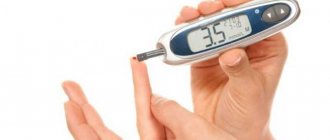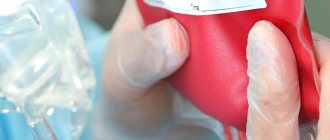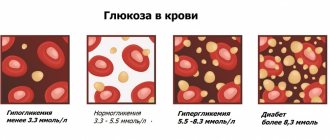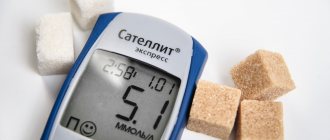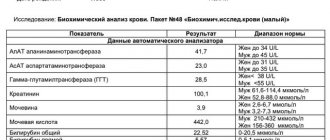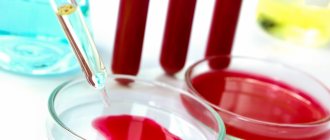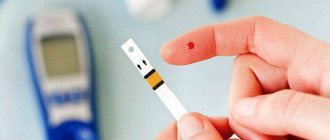List of what you can eat before donation
- Cottage cheese;
- Lean meat (such as poultry) and beef (in small quantities);
- Root vegetables (potatoes, beets, carrots, etc.);
- Self-grown fruits, however, should not be too sour;
- Mineral water and not too sweet compotes and fresh juices;
- Egg whites. The recommended amount is no more than one per day;
- Lean fish (such as pike perch, herring or cod);
- A simple soup made with vegetable broth.
Before you go to donate blood, plasma or platelets, you need to drink one glass of a natural drink. If this is not done, blood pressure may change sharply, which will lead to the development of a hypovolemic reaction. Before donating blood, the donor's food should enter the body approximately 2-3 hours before the procedure. This will help you avoid weakness and the risk of fainting.
What does a blood sugar test show?
The analysis shows the level of sugar (glucose) in the blood, which may indicate the presence of diabetes mellitus and other diseases.
Low sugar levels (hypoglycemia) can signal diseases of the pancreas, liver, kidneys and adrenal glands, as well as the hypothalamus.
The most common cause of high blood sugar (hyperglycemia) is diabetes. Hyperglycemia can also indicate other endocrine diseases, problems of the liver and hypothalamus, and a constant inflammatory process in the body.
There is also a glucose tolerance test (also known as a glucose tolerance test or GTT), which is performed to detect prediabetes and is also prescribed to pregnant women.
Nutritional Features
Before donating blood, drinking alcohol and smoking are prohibited for two days.
You also need to avoid spicy, fatty, fried, smoked foods . It is recommended to eat foods rich in carbohydrates: fruits, vegetables, cereals, pasta.
After the procedure, you need to regain your strength. To do this, eat foods rich in proteins, complex carbohydrates, fruits, nuts, dried fruits. It is recommended to focus on plant-based foods.
If we are talking about whole blood donation, then it will take about 30-40 days for complete recovery.
If a person donates individual components, for example, plasma, the recovery time will be shorter - about 5-6 days. During this time, it is recommended to adhere to the general rules for donors.
Blood sugar levels
lThe normal blood sugar level for an adult is:
- 3.3–5.5 mmol/l (when collecting capillary blood)
- 3.7–6.1 mmol/l (at sampling)
If the level is exceeded above 6.1 mmol/l, it is necessary to be examined.
In order for your results to be reliable, you need proper preparation for the sugar test.
Contraindications to donation
According to the order of the Ministry of Health dated September 21, 2001, there are absolute and relative prohibitions for donation.
Absolute contraindications:
- infectious diseases (AIDS, syphilis, brucellosis, etc.);
- diseases caused by parasites (toxoplasmosis, filariasis, etc.);
- somatic diseases of various organs (kidneys, liver, heart, lungs, thyroid gland, etc.);
- oncology;
- hypertension II-III degree;
- mental illness;
- recent operations on various organs;
- skin diseases (psoriasis, eczema, lupus, dermatitis, etc.);
- organ transplantation.
Temporary contraindications:
- Is it possible to drink water before donating blood from a vein for various tests?
- abortions;
- tattoos;
- acupuncture;
- travel to foreign countries (especially to Africa);
- communication with sick people;
- recent illnesses (ARVI, influenza, etc.);
- removal of a tooth;
- allergic rashes;
- VSD;
- pregnancy;
- period of menstruation;
- taking antibiotics, analgesics;
- consumption of alcoholic beverages;
- vaccinations;
- change in test results.
Time limits vary. For example, after an abortion you cannot donate blood for six months, after a sore throat - for a month, after a tooth extraction - for 10 days.
Stool tests:
- Stool examinations should not be carried out earlier than 2 days after an enema, an X-ray examination of the stomach and intestines, or a colonoscopy.
- You cannot take medications the day before, including: - laxatives; - Activated carbon; - preparations of iron, copper, bismuth; - use fat-based rectal suppositories.
- Do not allow urine or water into the sample.
- Conduct stool examinations in women during menstruation
Stool should be collected for examination in the morning. If this is difficult, you can prepare the sample in advance, but no more than 8 hours before submitting the stool to the laboratory. In this case, the sample should be stored in the refrigerator (do not freeze).
Thorough toileting of the external genitalia and anal area. Pre-urinate. Defecate in a dry, clean container: a vessel or a night vase. Transfer a stool sample of 3-5 cubic meters. cm in a pre-prepared, clean, dry container for storage and transportation.
Feces for occult blood
The patient should not eat meat, fish, or tomatoes 3-5 days before the test (they can be replaced with dairy and cereal dishes). The patient should not brush his teeth. The material is collected on the fourth day in a clean, dry container for storage and transportation.
Beverages
The consumption of liquids by the future donor deserves special attention. As practice shows, they affect test results no less strongly than food consumption.
The list of permitted drinks that can be used for 3-4 days before donating blood includes:
- Regular filtered or boiled water. It will not cause harm to the body, but it will not improve blood quality indicators either;
- Tea . It is best not very strong - for example, green. Sugar can be added sparingly;
- Compote. Any types of compotes made from dried fruits are suitable;
- Morse . In limited quantities and not very sour;
- Mineral water . It is advisable to focus on standard types of these products and not choose medicinal ones, saturated with certain substances;
- Juices . It is preferable to use fresh fruit and vegetable juices made with your own hands from non-acidic varieties of products.
Prohibited drinks
- Alcohol . In any form, from beer to vodka. A number of nutritionists recommend drinking 100 grams of red wine per day, but after the procedure to speed up its recovery;
- Sweet carbonated drinks . Coca-Cola, Sprite, similar products with flavors and other additives are strictly prohibited;
- Coffee . It is a conditionally prohibited drink, but can be used to a limited extent if it is made from natural grains and is not very strong. It is preferable to use substitutes for this drink - for example, based on chicory.
Preparing for a blood test
General rules when preparing for blood tests (clinical, biochemical, enzyme immunoassay blood tests)
The study is carried out in the morning on an empty stomach - at least 8 to 12 hours must pass between the last meal and blood drawing. In the evening of the previous day, a light dinner is recommended. It is advisable to exclude fatty, fried foods and alcohol from the diet 1–2 days before the examination. If there was a feast the day before or a visit to the bathhouse or sauna, it is necessary to reschedule the laboratory test for 1 - 2 days.
You must refrain from smoking 1 hour before taking blood.
You should not donate blood after X-ray examinations or physiotherapeutic procedures.
It is necessary to exclude factors that influence the research results: physical stress (running, climbing stairs), emotional arousal. Before the procedure, you should rest for 10–15 minutes and calm down.
It must be remembered that the result of the study may be distorted by the effect of the medications taken or the products of their metabolism. Prescription and discontinuation of any drug is accompanied by changes in laboratory parameters. Therefore, before taking the test, you should consult your doctor about the possibility of limiting your medications to prepare for the test. It is recommended to stop taking medications before donating blood for testing, that is, blood is drawn before taking medications.
Taking into account the daily rhythms of changes in blood parameters, it is advisable to carry out repeated studies at the same time.
Different laboratories may use different research methods and units of measurement. In order for the assessment of the examination results to be correct and the results to be acceptable, it is advisable to conduct research in the same laboratory at the same time.
Taking water does not affect blood counts, so you can drink water.
General rules apply to all tests, but some tests require special preparation and additional restrictions.
It is very important to strictly follow the recommendations below, since only in this case will reliable research results be obtained.
Features of preparation
to individual laboratory tests
Clinical blood test
Proper preparation for a clinical blood test:
- blood is donated in the morning on an empty stomach, 4-5 hours after the last meal)
- 1-2 days before the test, exclude high-fat foods from your diet.
Study of cholesterol and lipid spectrum
To determine cholesterol and lipid spectrum, blood is taken strictly after a 12-14 hour fast. It is necessary to discontinue drugs that lower blood lipid levels within 2 weeks, unless the goal is to determine the lipid-lowering effect of therapy with these drugs.
Urea
1-2 days before the study, you must follow a diet: stop eating foods rich in purines - liver, kidneys, and also limit meat, fish, coffee, tea in your diet as much as possible. Intense physical activity is contraindicated.
Uric acid
It is necessary to follow a diet in the days preceding the study - refuse to eat foods rich in purines: liver, kidneys, limit meat, fish, coffee, tea as much as possible in the diet. Intense physical activity is contraindicated. It is necessary to discontinue medications such as caffeine, theobromine, theophylline, salicylates, ascorbic acid, antibiotics, sulfonamides, thiazole derivatives.
Alpha-2-macroglobulin
You must abstain from meat for three days before the test.
Anti-Mullerian hormone
Inhibin B
For women, the study is carried out on days 3-5 of the menstrual cycle. 3 days before taking blood, avoid intense sports training. The study should not be performed during any acute illness. Do not smoke 1 hour before taking blood.
ACTH
Cortisol
On the eve of the study, avoid taking medications such as glucocorticoids, estrogens, oral contraceptives. It is also necessary to avoid drinking alcohol, exercising, and smoking. Due to the fact that ACTH and cortisol are stress hormones, you need to calm down and relax for 20 minutes before donating blood. Any stress causes an unmotivated release of these hormones into the blood, which will lead to an increase in this indicator. The level of these hormones changes cyclically throughout the day, so the most informative results are studies conducted no later than 2 hours after sleep and before 10 am.
Bilirubin
It is not recommended to take ascorbic acid, medications or products that cause artificial coloration of the serum the day before.
Sex hormones
Tests for sex hormones in women are carried out only on the appropriate days of the menstrual cycle of a particular patient, as indicated by the doctor.
In women of reproductive age, the results of hormonal studies are influenced by physiological factors associated with the phase of the menstrual cycle. When examining sex hormones, indicate the phase of the menstrual cycle.
Hormones of the reproductive system must be taken strictly on the days of the cycle:
LH, FSH - 3-5 days of the cycle;
Estradiol - 5-7 or 21-23 days of the cycle;
Progesterone - days 21-23 of the cycle;
17-OH-progesterone - 7-9 days;
DHA - sulfate, testosterone - 7-9 days.
Prostate-specific antigen (PSA)
Blood sampling should be performed before palpation examination and massage of the prostate gland (PG), laser therapy, radiography, cystoscopy, colonoscopy. These therapeutic and diagnostic measures can cause a more or less pronounced and prolonged rise in PSA levels in the blood. Since the extent of such changes is unpredictable, blood sampling must be carried out either before or a week after the manipulations.
Prolactin
Blood is drawn in the morning, no earlier than 3 hours after waking up. Considering that prolactin levels can increase as a result of physical or emotional stress, after sexual intercourse, after staying in a sauna, or drinking alcohol, it is necessary to exclude these factors before the study. Before the examination, exclude palpation of the mammary glands and ultrasound examination of the mammary glands.
Diagnosis of infectious diseases
(including urogenital infections)
Blood sampling for diagnostics is carried out before the start of taking antibacterial and chemotherapy drugs or no earlier than 10–14 days after their discontinuation. When performing tests for the presence of infections, it should be taken into account that, depending on the period of infection and the state of the immune system, any patient may have a false negative result. But, nevertheless, a negative result does not completely exclude the presence of infection and in doubtful cases it is necessary to re-test.
Immunogram
A blood test is taken strictly on an empty stomach, after a 12-hour fast and always before starting to take antibacterial, anti-inflammatory and hormonal drugs or no earlier than 2 weeks after their discontinuation. If on the eve of the test there was a rise in temperature, any acute or exacerbation of a chronic disease, then it is better to reschedule the test.
Allergy research
(Immunoglobulin E, Allergens)
Basic rules for preparing for an allergy test:
● Stop drinking alcohol, dietary supplements, vitamins, aspirin, and medications (except for vital ones; must be agreed with your doctor) at least two days in advance.
● It is not recommended to conduct studies during immunosuppressive therapy (cytostatics, glucocorticoids, radiation therapy, chemotherapy) due to inhibition of immunoglobulin synthesis.
● To exclude false negative results, it is necessary to refrain from taking anti-allergy medications 5 - 7 days before taking a blood test.
● Blood is donated on an empty stomach. In the morning you should not drink coffee, tea, or juices.
Contraindications for the study are:
● menstrual cycle (you can take the test 3 days before or 5 days after menstruation);
● acute phase of any infection (ARVI, influenza, fever and others);
● taking antibiotics (7-10 days after discontinuation).
Thyroid hormone test
2 - 3 days before the study, do not take iodine-containing drugs, 1 month - thyroid hormones (to get true basal levels), unless there are special instructions from the endocrinologist. However, if the purpose of the study is to control the dose of thyroid hormone drugs, blood is drawn while taking the usual dose. It should be borne in mind that taking levothyroxine causes a transient, significantly increased level of total and free thyroxine in the blood for approximately 9 hours (by 15–20%).
Thyroglobulin
It is advisable to conduct the study at least 6 weeks after thyroidectomy or treatment. If diagnostic procedures such as a biopsy or thyroid scan are prescribed, then a study of TG levels in the blood must be strictly carried out before the procedures.
Creatinine
Eating a large amount of protein in the days leading up to the blood draw can lead to an increase in creatinine levels in the blood. Blood creatinine levels may increase due to intense physical activity.
Serum iron
Blood sampling should be done before starting to take iron-containing nutritional supplements and medications or no earlier than 2 weeks after the end of use.
Bleeding time
It is necessary to stop taking aspirin and other antiplatelet drugs 5-7 days before the examination, as they prolong bleeding time.
Hemostasis system
(APTT, D-dimer, coagulogram, lupus anticoagulant,
prothrombin index, thrombin time, fibrinogen)
It is necessary to stop taking hormones, heparin, contraceptives, aspirin, antiplatelet agents 5-7 days before the examination.
SA-15-3
Blood sampling should be done before or no earlier than 2 weeks after biopsy, surgery and breast massage.
SA-125
In order to exclude the possibility of false-positive results in women of childbearing age, blood sampling should be carried out in the first phase of the menstrual cycle (7th – 8th day).
UBC (bladder cancer antigen)
Urine collection should be carried out before or 10 days after invasive procedures, as well as before the start of specific treatment. The morning portion of urine is collected, and if this is not possible, then urine that has been in the bladder for at least 3 hours is collected.
Cholesterol and lipid spectrum
To determine cholesterol and lipid spectrum, blood is taken strictly after a 12-14 hour fast (after eating a fatty meal, the level of triglycerides increases significantly and remains high for several hours
Before blood is drawn, the patient must maintain his normal diet for 2 weeks.
Avoid alcohol intake for three days (the presence of alcohol in the blood is a common cause of hypertriglyceridemia, even in fasting patients).
It is necessary to discontinue drugs that lower blood lipid levels within 2 weeks, unless the goal is to determine the lipid-lowering effect of therapy with these drugs.
Calcium
For 3 days, avoid taking medications containing calcium.
Prenatal screening
It is carried out within strictly defined periods of pregnancy. Outside of these periods, the diagnostic significance of these indicators is low.
Gastrin
H. Pylori IgG
One day before taking blood, it is necessary to avoid drinking alcohol and coffee, and 1 hour before taking blood - smoking. It is better to donate blood in the morning, after an overnight period of fasting. The study is carried out on an empty stomach (12 hours after the last meal),
Before the study, the patient should not take medications that affect gastric secretion:
One week before the study, cancel: Atropine, Metacin, Platyfillin, Gastrocepin, Pepsidin, Ranitidine (Zantac, Ranisan), Omez (omeprazole), Gastrozole, famotidine (quamatel, ulfamid), Lansoprazole, Rabeprazole (Pariet), Esomeprazole (Nexium).
2-3 days before the study, stop medications that neutralize hydrochloric acid: Gaviscon, Phospholugel, Almagel, Gastal, Maalox, Megalac and others.
The patient should discuss the possibility of stopping these medications with their healthcare provider in advance.
It is optimal to study gastrin levels before starting drug treatment or after its completion.
Take tests constantly in the same laboratory - and your doctor will approximately know your personal normal values and any deviation from the norm will be immediately noticed by him.
Home visit Addresses of medical offices Frequently asked questions Personal data processing policy
General rules
- For most studies, it is recommended to donate blood in the morning, from 8 to 11 o’clock, on an empty stomach (at least 8 hours must pass between the last meal and blood collection, you can drink water as usual), and on the eve of the study, have a light dinner with limited intake of fatty foods. For tests for infections and emergency studies, it is acceptable to donate blood 4-6 hours after the last meal. If you are taking medications, be sure to notify your doctor.
- Donate blood for gastrin-17, lipid profile (total cholesterol, HDL cholesterol, LDL cholesterol, VLDL cholesterol, triglycerides, lipoprotein (a), apolipoprotein A1, apolipoprotein B) and glucose tolerance test should be strictly on an empty stomach, after 12-14 hours hunger.
- 24 hours before the test, you must avoid alcohol, intense physical activity, and taking medications (in consultation with your doctor).
- 1-2 hours before the test, you must refrain from smoking, do not drink juice, tea and coffee, and you can drink still water. Avoid physical stress (running, quickly climbing stairs), emotional excitement. It is recommended to rest and calm down 15 minutes before donating blood.
- You should not donate blood for laboratory testing immediately after physiotherapeutic procedures, instrumental examination, X-ray and ultrasound examinations, massage and other medical procedures.
- When monitoring laboratory parameters over time, it is recommended to conduct repeated tests under the same conditions - in the same laboratory, donate blood at the same time of day, etc.
- Blood for research must be donated before starting to take medications or no earlier than 10-14 days after stopping them. To assess the control of the effectiveness of treatment with any drugs, a study should be conducted 7-14 days after the last dose of the drug.
How to eat before donating blood?
- You must follow a special diet for 2-3 days before donating blood. It is necessary to exclude fatty, fried, spicy, smoked, mayonnaise, ketchup, nuts, seeds, mushrooms from the diet;
- On the morning of donating blood, you should not eat dairy products, eggs, or butter;
- It is recommended to eat boiled cereals, pasta in water without oil, vegetables, fruits (except bananas);
- It is recommended to drink sweet tea with jam, fruit drinks, compotes, and mineral water. The donor needs to increase the volume of fluid consumed to 1.5 - 2 liters.
